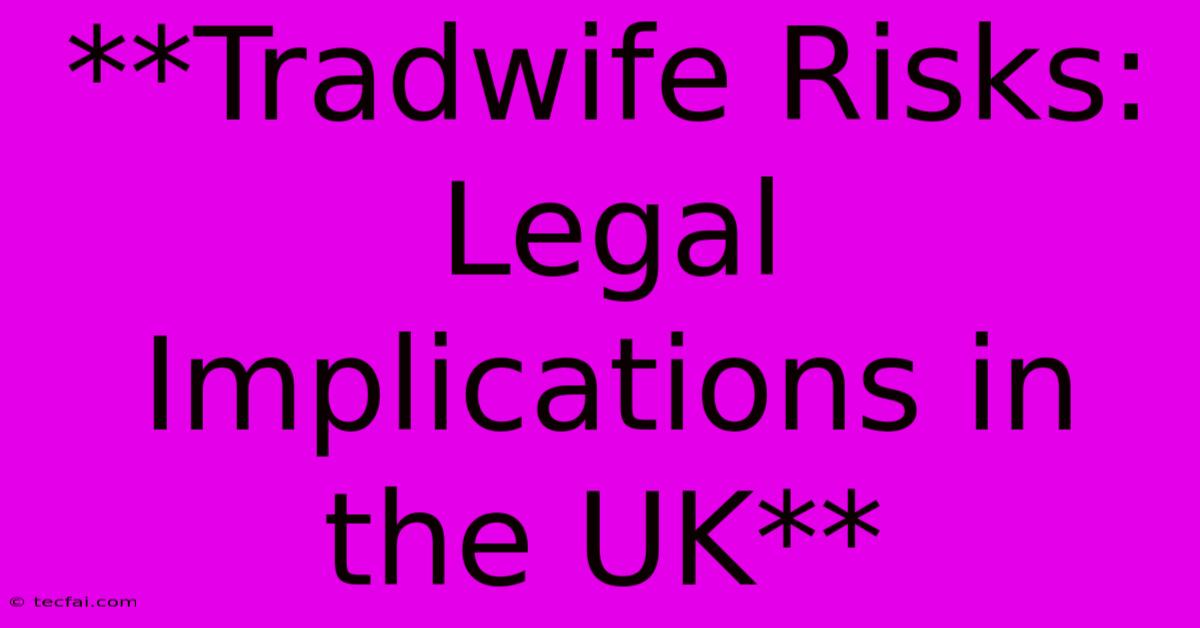**Tradwife Risks: Legal Implications In The UK**

Discover more detailed and exciting information on our website. Click the link below to start your adventure: Visit Best Website tecfai.com. Don't miss out!
Table of Contents
Tradwife Risks: Legal Implications in the UK
The "tradwife" lifestyle, characterized by traditional gender roles, domesticity, and a focus on homemaking, has gained traction in recent years. While this lifestyle choice can be empowering for some, it's important to understand the potential legal implications that might arise in the UK context. This article explores the key risks associated with "tradwife" practices and how they might intersect with UK law.
1. Employment and Financial Independence:
The Risk: A "tradwife" lifestyle often prioritizes staying at home while the husband provides for the family financially. This can lead to financial dependence and potential vulnerability if the marriage ends or the husband loses his income.
Legal Implications: The UK has strong legal frameworks promoting equal rights and opportunities for all individuals. This includes:
- Equal Pay Act 1970: Guarantees equal pay for men and women doing the same or equivalent work.
- Sex Discrimination Act 1975: Protects individuals from discrimination based on sex, including employment opportunities.
- The Equality Act 2010: Combines previous equality legislation and provides comprehensive protection against discrimination in various areas, including employment.
Implications for "Tradwife" Lifestyle: While individuals have the right to make personal choices, it's crucial to consider the potential financial risks of relying solely on a husband's income. Women should explore their own career options, maintain financial independence, and ensure access to independent income streams.
2. Domestic Violence and Abuse:
The Risk: While not inherent to the "tradwife" lifestyle, the traditional power dynamics often associated with it can create a risk for domestic violence and abuse.
Legal Implications: The UK has robust laws against domestic violence and abuse, including:
- Domestic Violence, Crime and Victims Act 2004: Defines domestic violence and abuse and provides legal protection for victims.
- Protection from Harassment Act 1997: Protects individuals from harassment, including stalking and intimidation.
Implications for "Tradwife" Lifestyle: It's important to recognize that domestic violence can occur in any relationship, regardless of lifestyle choices. Individuals should seek support and resources if they experience or witness abuse. Organizations like the National Domestic Violence Helpline offer confidential advice and guidance.
3. Childcare and Parental Responsibility:
The Risk: "Tradwife" ideology often emphasizes the mother's primary role in childcare. However, this can lead to practical challenges and legal issues related to child custody and parental responsibility.
Legal Implications: The UK legal system emphasizes the shared responsibility of both parents in caring for their children. This includes:
- Children Act 1989: Establishes the principle of shared parental responsibility and provides guidelines for child custody arrangements.
- Family Law Act 1996: Outlines legal frameworks for divorce and child custody proceedings.
Implications for "Tradwife" Lifestyle: It's important for couples to discuss and agree on child care arrangements and parental responsibilities. While a mother may choose to prioritize childcare, the father also has legal obligations and responsibilities towards their children.
4. Marital Agreements and Financial Arrangements:
The Risk: The "tradwife" lifestyle might imply a traditional division of labor and finances within a marriage. However, this can lead to legal complications if the relationship dissolves.
Legal Implications:
- Matrimonial Causes Act 1973: Provides legal frameworks for divorce and financial settlements in the event of separation.
- Pre-nuptial Agreements: Can be used to define financial arrangements in advance of marriage. However, UK courts do not always enforce pre-nuptial agreements fully.
Implications for "Tradwife" Lifestyle: While pre-nuptial agreements can offer some clarity, they are not always legally binding. Couples considering a "tradwife" lifestyle should consult with legal professionals to understand their legal rights and options concerning financial arrangements and property ownership.
Conclusion:
While the "tradwife" lifestyle can appeal to individuals seeking a traditional approach to marriage and family, it's important to be aware of the potential legal implications. It's crucial to ensure financial independence, understand legal frameworks for domestic violence, child care, and marital agreements, and consult with legal professionals to protect individual rights and interests. Ultimately, embracing a "tradwife" lifestyle should be a conscious choice made with a clear understanding of the potential risks and legal consequences involved in the UK.

Thank you for visiting our website wich cover about **Tradwife Risks: Legal Implications In The UK**. We hope the information provided has been useful to you. Feel free to contact us if you have any questions or need further assistance. See you next time and dont miss to bookmark.
Featured Posts
-
Dave Coulier Diagnosed With Stage 3 Lymphoma
Nov 14, 2024
-
Gaetz Attorney General Nomination
Nov 14, 2024
-
Tommy Fury Praised For Daughters Wishes
Nov 14, 2024
-
Ionic Rare Earths Boosts Magnet Recycling
Nov 14, 2024
-
Planning Megalopolis Expert Review
Nov 14, 2024
